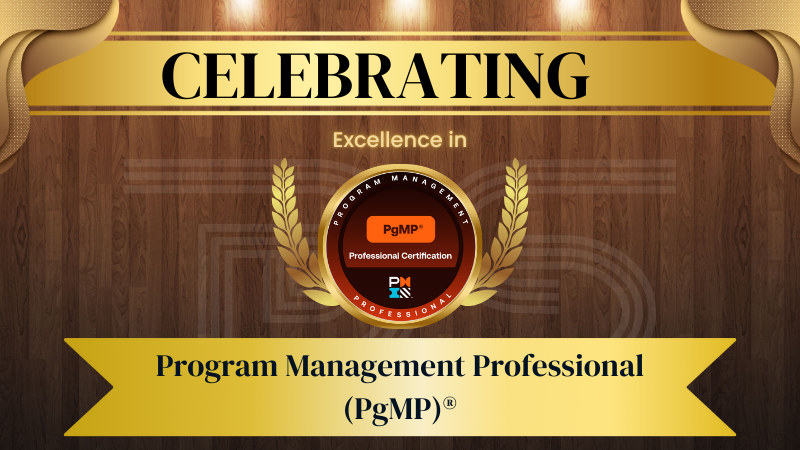
by DharamCW | Mar 22, 2025 | PMI Certification Success Stories, Professional Resilience and Inspiration Stories
🌟 Program Management Professional (PgMP) Success Stories | Dec 2024 – Mar 2025 🌍
🚀 A Global Celebration of Excellence!
A huge congratulations to the newest PgMP® certified professionals who achieved this prestigious milestone between December 2024 and March 2025 with vCare Project Management! 🎉
📌 A Proud Milestone:
Since our inception, we have been honored to mentor and guide 541 professionals across 57 countries toward their PgMP® success. This achievement reflects the dedication, resilience, and strategic mindset required to excel in program management at the highest level.
🌍 PgMP® Global Landscape (as of Feb 28, 2024):
✅ Approx. 7,900 Active PgMPs worldwide
✅ Top Countries: China, North America, MENA, Asia Pacific, South Asia, Europe, Latin America
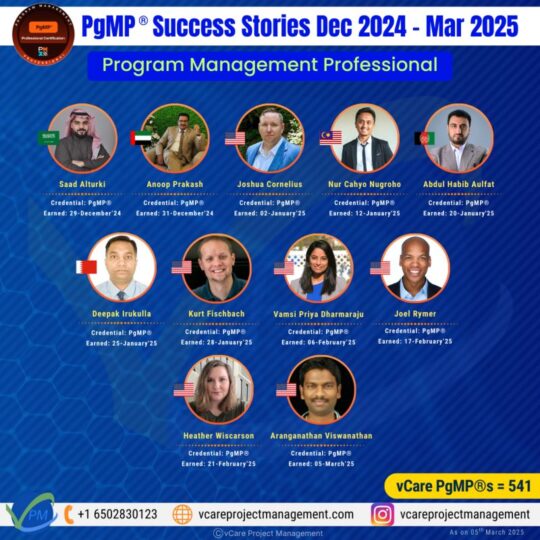
541 professionals across 57 countries have now joined the PgMP elite with vCare Project Management. Discover their stories and start your own.
🔥 What’s Next for You?
📌 Are you ready to join this elite league of program managers?
📌 Looking for expert guidance on the PgMP® application, preparation, or exam strategy?
Let’s talk! Obligation-free consultation session using http://talktodharam.com, and let’s shape your PgMP® success story together!
View our upcoming PgMP Programs
Online – http://bit.ly/2oBKQXQ
Direct – http://bit.ly/2oCfpg0
Join our PgMP4U LinkedIn Group for the latest updates – http://bit.ly/2SBPwIp
Explore our useful PgMP Study Materials:
Complete Reference Guide for PgMP Certification | 6th Edition – https://bit.ly/3gsEkKj
PgMP Pathfinder | PgMP Mind Maps based Examination Content Outline – https://bit.ly/3pLkazn
The Standard for Program Management | Fifth Edition – https://bit.ly/43lqq4I
PgMP Challenger Gold (Mock Exams 1 to 5) | Exam Simulator – https://bit.ly/3NGrysU
PgMP Challenger Silver (Mock Exams 1 to 3) | Exam Simulator – https://bit.ly/44rOIKY
PgMP Challenger Mock Exam 1 | Exam Simulator – https://bit.ly/2RMmMAk
PgMP Challenger Mock Exam 2 | Exam Simulator – https://bit.ly/3Urs7JA
PgMP Challenger Mock Exam 3 | Exam Simulator – https://bit.ly/3JM9afX
For more insights into program management certification, training, and career development, book a personalized, obligation-free consultation session using http://talktodharam.com
Looking to deepen your knowledge? Check out our upcoming webinars featuring global experts,
1. Strategic Leadership & Operational Excellence, featuring Jay Brough – https://bit.ly/41sSraX
2. Influencing Organizational Culture, featuring Jeffery Porter – https://bit.ly/4ifsEsy
Success isn’t a destination—it’s a journey. Keep pushing boundaries, and let’s lead the future of program management together.
#vCarePgMP #PgMPsuccess #DharamSingh #ProgramManagement #Leadership #PMI #CareerGrowth #PgMPmilestone #PgMPjourney #vCareProjectManagement
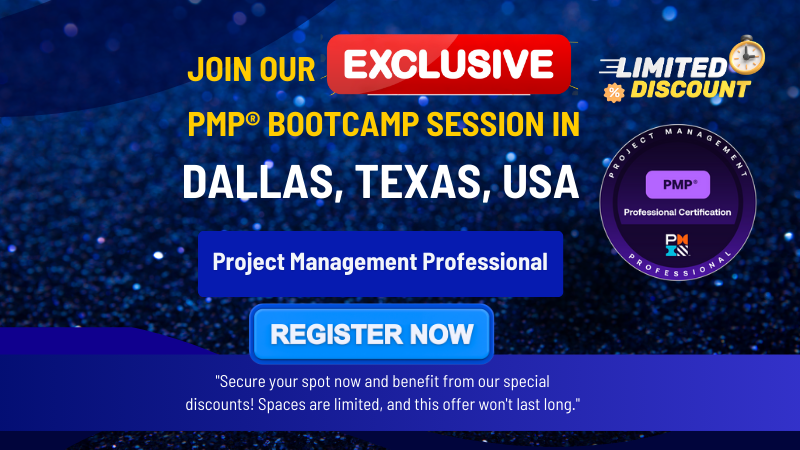
by DharamCW | Mar 21, 2025 | vCare PMI Certification Training Classes
🚀 Get PMP® Certified with vCare Project Management | March 27th – 30th, 2025 | Live in Dallas 🎯
I’m excited to personally lead our upcoming PMP® Bootcamp in Dallas—an intensive 4-day program designed to equip you with everything you need to achieve PMP certification and accelerate your project management career.
📍 Date: March 27th – 30th, 2025
⏰ Time: 9:00 AM – 5:00 PM (CDT)
📌 Location: Dallas, Texas
🎓 PMI-ATP Authorized Training
🔗 Register Now: https://bit.ly/3Y3zn09
💼 What You’ll Gain:
✅ Access to PMI Authorized PMP® Exam Prep Content
✅ 35 Contact Hours/PDUs
✅ Complete application and audit support
✅ Real-world strategies, tips, and exam mastery techniques
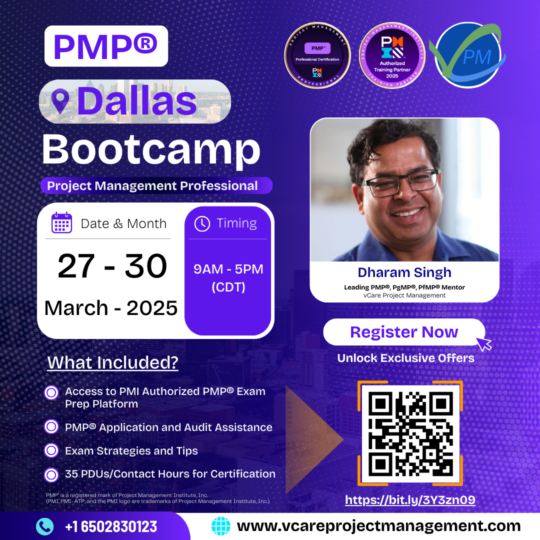
Accelerate your project management career with PMP certification—join our Dallas Bootcamp from March 27–30, 2025, led by Dharam Singh.
Having mentored over 540+ PMP®s, 542+ PgMP®s, and 168+ PfMP®s globally, I bring 30+ years of experience into every session—bridging theory with practical execution.
🧭 Explore Other PMP Offerings:
🎯 Direct Bootcamps: http://bit.ly/3ic7GRF
🎯 Online Mentoring Programs: https://bit.ly/2BU0mFp
🎯 Fast Track Personal Mentoring: http://bit.ly/38gosHu
📝 PMP Application Support: http://bit.ly/3esggIb
💬 Need Help Choosing the Right Path?
Book a FREE 15-minute consultation with me:
🔗 http://www.talktodharam.com/
📺 Stay Connected:
🔔 Subscribe to our YouTube Channel – Project Management Q&A & Success Stories: https://bit.ly/2YF0wJl
🎙 Follow my Podcast Interviews with Project Management Experts: https://bit.ly/2NDY8wd
📞 Questions? Call us at +1 650 283 0123
🌐 Visit: https://www.vcareprojectmanagement.com
Take the next step with confidence. Let’s make your PMP journey a success! 💪
#PMPBootcamp #ProjectManagement #PMPCertification #Dallas #vCareProjectManagement #PMI #CareerGrowth #DharamSingh #PMIATP #Leadership #PMPTraining #Mentorship #PDUs #PMICertification
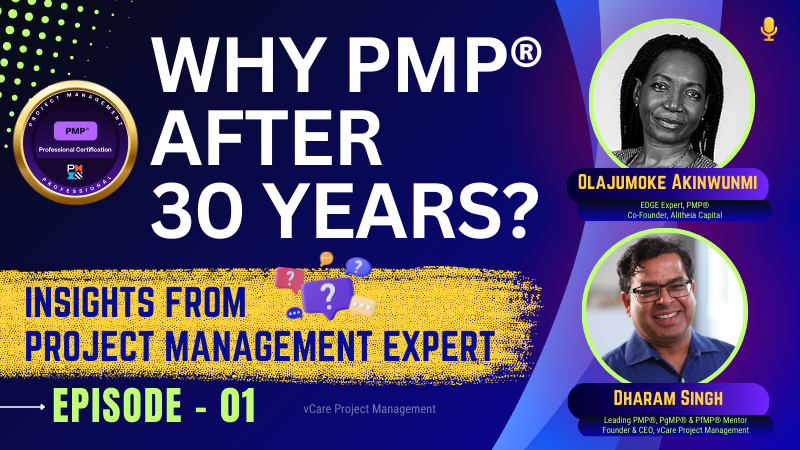
by DharamCW | Mar 19, 2025 | Podcast, Project Management, Uncategorized
– Book an obligation-free consultation session on Project management Career, training, and certifications:
http://talktodharam.com
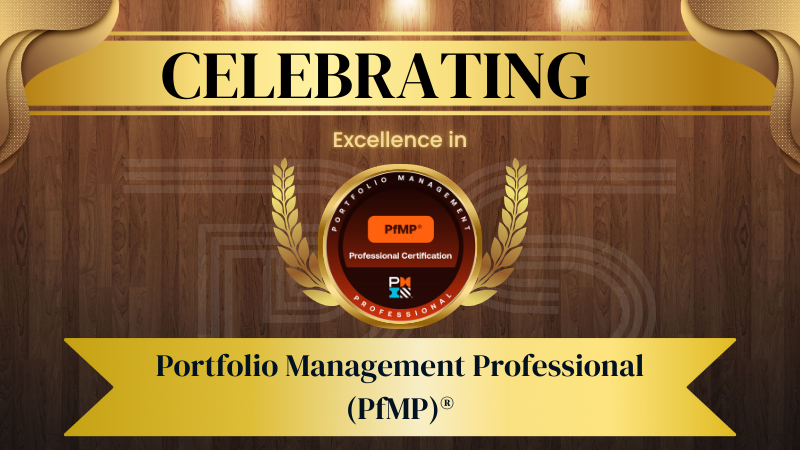
by DharamCW | Mar 16, 2025 | PMI Certification Success Stories
🎉 Celebrating PfMP® Success: December 2024 – March 2025! 🌟
A huge congratulations to all professionals who achieved their Portfolio Management Professional (PfMP)® certification with the support of vCare Project Management! 🎯
🚀 We are thrilled to share that the global PfMP® community has now grown beyond 2,100+ certified professionals, with 167 new PfMP®s across 35 countries who trusted vCare’s expertise in their journey.
This milestone reflects the effectiveness of our structured training, mentorship, and exam preparation resources. We are proud to be part of your success and look forward to guiding more professionals towards portfolio management excellence.
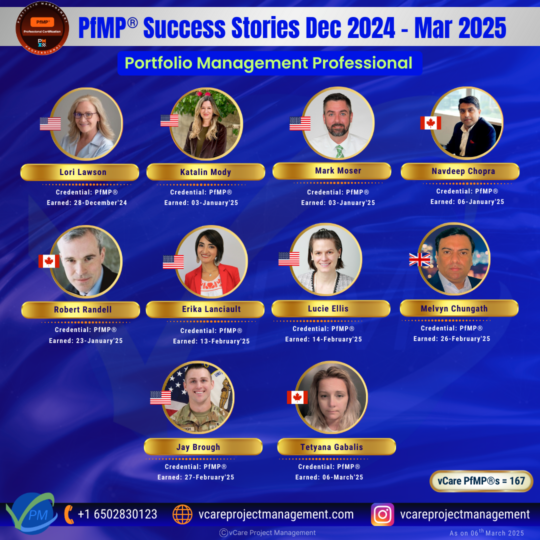
167 professionals earned their PfMP certification with vCare’s guidance! Join our training programs and advance your career.
🔹 Ready to elevate your portfolio management career?
Let’s make your PfMP® journey a success! DM me for guidance.
📌 Explore Our PfMP® Programs:
🌐 Online Training → http://bit.ly/39jOZSf
🏛 Direct Training → http://bit.ly/38er2M3
📌 Join Our PfMP® Community:
PfMP4U LinkedIn Group → http://bit.ly/31P7GKR
📌 Essential PfMP® Study Materials:
PfMP Pathfinder – https://bit.ly/35j9Dli
The Complete Reference Guide for PfMP Certification – https://bit.ly/3pU4ud5
PfMP Challenger Mock Exam 1 | Exam Simulator – https://bit.ly/3KKZkv3
PfMP Challenger Mock Exam 2 | Exam Simulator – https://bit.ly/3VlI5FH
PfMP Challenger Mock Exam 3 | Exam Simulator – https://bit.ly/3VNrfRL
PfMP Challenger Gold (Mock Exams 1 to 3) | Exam Simulator – https://bit.ly/3KCjbNh
📌 Upcoming Webinar:
🔹 Resilient Leadership in Cyber-Driven Programs with Dr. Maria Sette → https://bit.ly/4j9fmPA
📌Need expert guidance? Book a free consultation with me: http://talktodharam.com
🎥 Stay Updated with Project Management Insights!
🔔 Subscribe to vCare Project Management YouTube Channel: https://bit.ly/2YF0wJl
🎙 Follow My Podcasts & Expert Interviews: https://bit.ly/2NDY8wd
#PfMP #PortfolioManagement #PMICertification #vCarePfMP #CareerGrowth #SuccessStory #Leadership #ProjectManagement #GlobalCommunity #PfMPTraining #CertificationSuccess
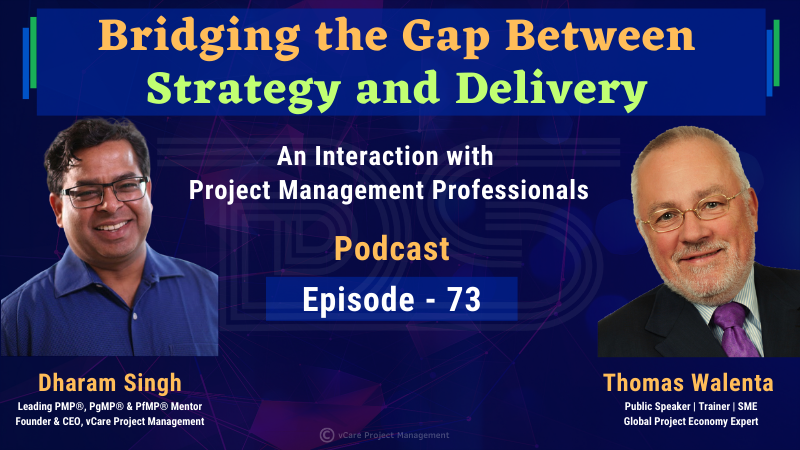
by DharamCW | Mar 15, 2025 | Podcast, Project-Program-Portfolio Management Knowledge
Bridging the Gap Between Strategy and Delivery | Thomas Walenta | Dharam | Episode 73
🎥 Watch now: https://youtu.be/ttQuV57dL4c
📝 Discussion Topics:
– Bridging the Gap Between Strategy and Delivery
– What are the most common challenges in aligning strategy with execution, and how can organizations overcome them?
– Discuss the importance of visionary leadership in strategy execution and how leaders can effectively communicate and unite their teams around strategic goals?
– How will emerging technologies such as AI and blockchain impact strategy execution in the next five years? Can you provide specific examples of these technologies in action?
– What is your strategy to utilize these new technologies in your business to create more value for your customers?
– How important is organizational culture in determining the success of strategy execution, and what steps can leaders take to foster a culture that supports strategic goals?
– Share a strategic initiative from your past that didn’t go as planned and the lessons learned from that experience.
– What are the key skills and competencies must tomorrow’s leaders develop to excel in strategy execution, considering the fast-paced changes in global markets and technologies?
– How can organizations use advanced analytics and data insights to improve their strategic execution? Are there specific sectors or projects where this is particularly critical?
🚀 Looking to deepen your knowledge? Check out my upcoming webinars featuring global experts,
1. Resilient Leadership in Cyber-Driven Programs: Strategies from a Transformation Expert featuring Dr. Maria Sette – https://bit.ly/4j9fmPA
2. Strategic Leadership & Operational Excellence featuring Jay Brough – https://bit.ly/41sSraX
– Book an obligation-free consultation session on Project management Career, training, and certifications: http://talktodharam.com
– Discover training offers and certification discounts: https://bit.ly/3jWVepD
– Stay updated with our Q&A series and certification success stories by subscribing to the vCare Project Management YouTube channel at https://bit.ly/2YF0wJl
– Follow my podcasts and interviews with Project Management Experts on YouTube at https://bit.ly/2NDY8wd
#StrategyExecution #Leadership #VisionaryLeadership #StrategyAndExecution #EmergingTechnologies #AIinBusiness #BlockchainStrategy #DigitalTransformation #TechInBusiness #OrganizationalCulture #AdvancedAnalytics #BusinessStrategy #FutureOfWork #PgMP #PfMP #PMP #AskDharam #DharamSingh #vCareProjectManagement











🚀 Why Pursue PMP After 30 Years in Project Management? 🎙️
I had the privilege of speaking with Olajumoke Akinwunmi, EDGE Expert, PMP®, and Co-Founder of Alitheia Capital, in the first episode of our latest podcast series: “Innovative Project Management Practices.”
🔹 What made her pursue PMP after nearly three decades in project management?
🔹 How has PMP helped her refine her approach to managing real estate and investment projects?
🔹 What role does PMP play in establishing credibility, mentorship, and stakeholder management?